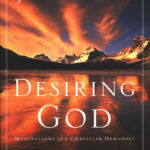Better Sanctification Through Imagination
This week at least two of my favorite ministries took some missteps. Naturally I would think so, because I write for SpecFaith and love imagination, I may wrongly object when other Christians aren’t behaving “speculatively” enough or else condemn speculation outright. But because I actually love these ministries, I may be a good critic.
 Exhibit A (today’s only exhibit): Desiring God Ministries.
Exhibit A (today’s only exhibit): Desiring God Ministries.
Author/pastor John Piper focuses this Oct. 8 column specifically on preaching. Folks in Piper’s circles tend to do that: They will speak not necessarily to “lay Christians,” but to other preachers about preaching. Fortunately we “lay” folks can still appreciate what’s said because Christians must avoid sitting back and letting preachers do the heavy lifting for us. In this case it’s a vital distinction: Piper is talking primarily to preachers about preaching.
… In handling the Scriptures, sanctification and speculation rise and fall in inverse proportion. As speculation increases, sanctification decreases. The more guessing the less blessing.
Few people would give their life for a speculation. Few will gouge out an eye or cut off a hand, because of a guess. Suppositions make weak expositions.
“In handling the Scriptures,” “few people would give their life [sic] for a speculation [about the Bible,” “suppositions make weak [Biblical] expositions,” et cetera — again, Piper speaks primarily against valuing speculation about the Bible over the “sure word of God.” He then offers a few examples. I could offer a few more because we’ve all heard these sermons — the supposed “needle’s eye gate”1 behind Jesus’s warning in Matt. 19:24,2 suggestions that Old Testament prophecies about Israel are somehow also about the U.S., and of course those dashed Nephilim who at best distract from Gen. 6’s meaning.
Biblical speculation is okay, but at best secondary to Scripture’s clearer meaning. If we read Matt. 19 and get distracted by researching a “needle’s eye gate,” instead of taking seriously Christ’s warnings against self-righteous reliance on our own wealth, we’re doing it wrong.
Yet Piper seems to downplay the value of speculative imagination far more broadly:
What About Poetry?
Two qualifications:
- Poetry and preaching are not the same. Illuminating fiction and authoritative exposition are not the same. I love poetry and fiction. These are by nature inventive. They too have their place and their power. But the sanctifying power they have is owing decisively to the deeper truths they convey, not the imaginative structures that convey them.
At least from my reading of it, this drives me all sorts of crazy.
1. This reduces the sanctifying (holiness-making) role of Biblical poetry and fiction.
Did the Spirit-inspired Psalmists not “preach” in their poetry? Did Christ not “preach” in His parables? Granted, specific truth-transmission via Biblical expositional preaching is the most direct way to learn about God’s truth. Yet this view too easily becomes: “expositional preaching is the only way or most often the best way to grow holy in His truth.”
2. This reduces the value of Biblical speculation that does contribute to holiness.
For me, certain views of Scripture once were tantamount to bizarre “speculation,” such as the notion that God is absolutely sovereign yet works with man’s choices. So to say, “That’s only silly speculation, but this is the clear Word of God” may be right or may be wrong.
Furthermore, why not speculate about certain glorious truths of Scripture that help us fix a picture to an otherwise abstract truth? Good preachers do this all the time at Resurrection Sunday alone. What did Christ feel on the cross? Scripture tells us some, but we may fill in the rest — yet hold loosely to the images and not valuing them as highly as God’s Word.
Recently I’ve been reading a compilation of edited Charles Spurgeon sermons: Spiritual Warfare In A Believer’s Life. Being unfamiliar with Spurgeon beyond the ubiquitous quotes from him, I’ve been stunned by his faithfulness to Scripture (as readers often report) but also his openness to topical preaching and speculation! In exploring Satan’s temptation of Jesus in Matt. 4, Spurgeon keeps to the text, yet suggests Christ may have been truly afraid (which is not a sin) before Satan tempts Him to jump off the Temple pinnacle. For a whole paragraph that feels almost Lewis-like, Spurgeon compares this strange desire — “you may fall, so go ahead and get it over with” — to our own inclinations to sin so we won’t sin.
Is this flawed “speculative” preaching? Surely not (and not only because Spurgeon did it).
3. This implicitly rejects the sanctifying power of other imaginations.
“The sanctifying power [poetry and fiction works] have is owing decisively to the deeper truths they convey, not the imaginative structures that convey them.” Alas, this couldn’t be more wrong! Yet for a while I’ve wondered if some Christian leaders hold this view.
Here Piper says plainly what many are thinking: Even if fiction is good, it’s only because of the “deeper truths” it conveys.
Previously I’ve taken this to a logical conclusion: why then not cut out the artsy middle man and only rely on expositional preaching and systematic theology? Clearly the best reason is: God didn’t communicate His own Word this way. “Systematizing” what He did communicate can be helpful. But God did not “pre-systematize” His original Word.
 Strangely, saying “imaginative structures” can only help by “conveying” truth is contrary to Piper’s own rightful extolling of the beauties of God, the wonders of God, the awe of God. To use Piper’s own frequent examples of the Grand Canyon’s beauty, one might as well gaze over the canyon and very “spiritually” conclude that this natural wonder’s only benefit is that it helps us think that “God is big, just like this canyon.” Is the Grand Canyon only useful as a spiritual prop? Should we then not even bother about the “imaginative structure” of this (ultimately) God-created wonder? Test rocks? Take photos? Explore hidden trails?
Strangely, saying “imaginative structures” can only help by “conveying” truth is contrary to Piper’s own rightful extolling of the beauties of God, the wonders of God, the awe of God. To use Piper’s own frequent examples of the Grand Canyon’s beauty, one might as well gaze over the canyon and very “spiritually” conclude that this natural wonder’s only benefit is that it helps us think that “God is big, just like this canyon.” Is the Grand Canyon only useful as a spiritual prop? Should we then not even bother about the “imaginative structure” of this (ultimately) God-created wonder? Test rocks? Take photos? Explore hidden trails?
Piper’s teaching has blessed thousands, even if solely through his clarifying phrase, “The chief end of man is to glorify God by enjoying Him forever.”3 We grow in holiness primarily through God’s sure Word, yet also with all His other gifts. His gifts include poetry, fiction, and all other good expressions of imagination. “Deeper truth” alone is not beautiful; it is half-truth. Truth needs imagination. And we cannot enjoy imagination without “imaginative structures.”
Or as another writer said it:
Fiction and poetry provide authors a unique way to glorify Christ that more overtly intellectual genres, like theology, simply can’t. These genres that aim directly for the heart and soul—rather than aiming at the heart through the mind—do not argue for belief, they show what it looks like and make you feel it. Theology, devotionals, and other books in the “Christian Living” section of the bookstore talk about belief explicitly. Their goal is to explain truth as clearly as possible. Fiction and poetry, on the other hand, tell the truth, but tell it slant. They offer an author a way to give his beliefs flesh and blood by enacting them in the confusion of the real world. In fiction, belief is not what you look at, but what you look through.
You said it, brother. Oh wait. You said that?
- If this were true, it absurdly detracts from the point of Jesus’s hyperbole. ↩
- Also in Mark 10:25 and Luke 18:25. ↩
- On SpecFaith I explored this further in Beauty and Truth 3: The Chief End of Man, and its application for story-enjoyment in Beauty and Truth 4: The Chief End of Story. ↩










































What we have here with Piper is the age-old dissonance between what I call the creative temperament vs the non-creative temperament. NCT people just simply do not see or feel the need of CT people just to create. This can range from Piper’s downplaying of the power of imagination to twisted notions that since all fiction is a form of man-made fabrication, ALL stories are therefore a lie and hence of the devil. I have seen both extremes expressed. God’s Word does not condemn imagination, only the sinful misuse of it. God’s Word does not condemn story, either (Jotham’s fable in Judges immediately comes to mind). What God’s Word DOES condemn is speculative imagination that posits another view of things contrary to what God has expressed. We are indeed to make every thought captive to the obedience of Christ. This includes the Christian imagination. But that being said, I really do think Piper’s post is a result of the antagonism of the NCT against the CT. NCT people see no use or real need for creative pursuits, especially ones that do not appeal to them. I hear Piper when he says fiction has value when it supports Scripture, but story needs no justification. God could have made spring and fall drab green. But He chooses instead to wreathe His world in beauty. So should we in our writing, our music, our art, whatever that may be. Art, story need no justification. God has already provided it.
One thing that I get really, REALLY tired of are these people who grind down any real exploration of faith. From the way they talk, uncertainty is a bigger sin than gleefully mowing down pedestrians with a truck, and mere conviction in this set-in-stone doctrine is a bigger virtue than charity. For as much as they vilify the sheepish masses, they sure browbeat their followers into never questioning.
Piper here doesn’t show such an attitude at all. That’s a completely different issue.
He’s implicitly accusing the speculators of straying from the straight-and-narrow, so I’d say it’s not unrelated.
Yet I’m not reading “accusation,” only caution for those already in agreement that Scripture is God’s Word and out of love for God, we must not deviate from it. Even if he were accusing, though, are you not in turn doing the same thing by accusing Piper of “vilify[ing] the sheepless masses” and “browbeat[ing his] followers”? Them’s “you’re deviating from the righteous spiritual path” words.
So even assuming the worst, no one here is on the spiritual high ground. We all have beliefs on which is the right choice, the wrong choice, and the worst sins.
You probably haven’t been accused of being too liberal, which is to say, heretical. Do you know how fine the line is between cautions and accusations when it comes to denominational differences?
In the DG piece, however, Piper did not go after liberalism but instead silly evangelical attempts to find all kinds of trivia goodies in the Bible. None of his examples are unique to liberal denominations. None of mine were either. I’ve heard the “needle’s eye gate” notion and Nephilim nonsense only in conservative evangelical circles. Piper rightfully cautions against those, nd yet strangely (and contra his own expressed views elsewhere) confuses the purpose of imagination and the purpose of preaching expositional truth.
I’m not saying Christians can never be mean, can’t step over the line from cautions to your own side to condemnations of other folks. But that wasn’t the point of the Piper column — and so far I’ve only seen one “pre-emptive strike” style of denominationally/spiritually driven accusation in this meta.
I’d like to point out that he lumped female leadership into the dismissal pile with the Nephilim.
(Incidentally, it’s rather rare that I end up defending a certain Christian author’s material in one sub-conversation after the blog, and adding to my critique of the same author in another sub-conversation.)
You are not reading Piper rightly. You also accidentally conflated what he said with what I said. (One of us should be insulted! 🙂 ) Piper did not mention the Nephilim; I did. Moreover, despite Piper’s expressed views elsewhere, he does not even address the female leadership issue, only the extra-Biblical speculation about why Paul said what he said. Moreover, Piper would not oppose “female leadership” anyway.
(P.S.: Some similar Christian leaders, including many affiliated with Piper, are indeed clueless about gender issues, and some lean toward active misogyny, and some are just plain misogynist. None of my rebuttal dismisses this legitimate concern.)
I hope you’re right about his views on female leadership, because this kind of boundary-reinforcement is exactly the kind of stuff the nutter-butters do. Reinforce the tribal boundaries, make sure everybody knows how good it is on the inside and how evil/stupid it is on the outside, then make use of the tribal boundaries to keep people in line or ostracize and expel them from the tribe. Which, granted, is what most “tribes” do, but the rules in the nutter-butters’ circles tend to revolve more around “disagreeing with my interpretation of the Bible, the only correct one, which is a challenge to my authority” than things like “don’t be a jerk.”
I think you are over reading this – particularly knowing John Piper’s love for poetry. He only says the value is in the deeper truth that is conveyed – that doesn’t mean that it has to be allegory or even something that could be conveyed in a sermon. It may just be the wonder of existence, the complexity of human relationships, even just the beauty of language and what can be done with words – these are all “deeper truths”.
I would favor that interpretation, if not for his specific remark about there being no worth for sanctification in “imaginative structures.”
If I had to guess, though, I’d say this is more of a “relapse” to spiritual-sounding slogans. Piper otherwise preaches solidly about the centrality of God’s Word, and yet how other gifts of God glorify Him (including fiction, poetry, and imagination). And of course, as noted above, Desiring God features some of the best content about how fantasy stories and imagination glorify God, when they touch on the topics.
There is definitely a tension between imagination and “fact,” but that doesn’t meant they’re opposites.
I kind of agree with the over-reading point. I don’t think he’s discounting speculation in general, but he’s talking about pastors, teachers, and Bible study leaders focusing on “What if?” scenarios that won’t really help. I think the kind of sanctification that fiction provides is of a different type, and is fine to speculate on. The problem is more that you shouldn’t go into a church and be taught trivia when you need direct preaching and teaching on how to live.
As I noted, at first Piper does focus only on Bible preaching, by preachers.
But also as noted, Piper briefly expands the topic to discuss all fiction. He is now no longer addressing only preachers and preaching. He makes a general statement that imaginative works’ holiness-making power is only in “the deeper truths they convey.”
I understand what he’s getting at, but I still disagree. Imagination is its own sanctifying, God-exalting power. As H G Ferguson said above, the use of creativity and art to reflect God’s glory needs no other “well it conveys something better” defense.